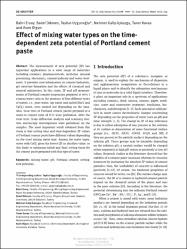Effect of mixing water types on the timedependent zeta potential of Portland cement paste
Abstract
The measurement of zeta potential (ZP) has
important applications in a wide range of industries
including ceramics, pharmaceuticals, medicine, mineral
processing, electronics, cement industry and water treatment.
It
provides
new information on cement
hydration,
gel
structure
formation and the effects of chemical and
mineral
admixtures.
In this study,
ZP and pH measurements
of Portland
cement
suspension prepared
at wt %
1
cement/water
ratio
in the presence
of four different
types
of
waters,
i.e.,
pure
water,
tap
water,
and salted
(NaCl and
CaCl
) water, were carried out depending on the time.
Also, vicat tests of Portland cement pastes prepared at a
water-to-cement ratio of 0.34 were performed. After the
vicat tests, X-ray diffraction analysis and scanning electron
microscopy
investigations
were
performed on the
samples.
The most important result
obtained from
this
study
is that setting
time and time-dependent
ZP values
of
Portland
cement
paste
have
different
values
depending
on
the used mixing
water
type. Among
the water
types,
water
with CaCl
2
gives the lowest ZP as absolute value, so
this leads to minimum initial and final setting times for
the cement paste prepared with this type of water.
2
Source
Science&Engineering Composite MaterialsVolume
20Issue
3Collections
- Makaleler [36]
- Scopus İndeksli Yayınlar Koleksiyonu [140]



















